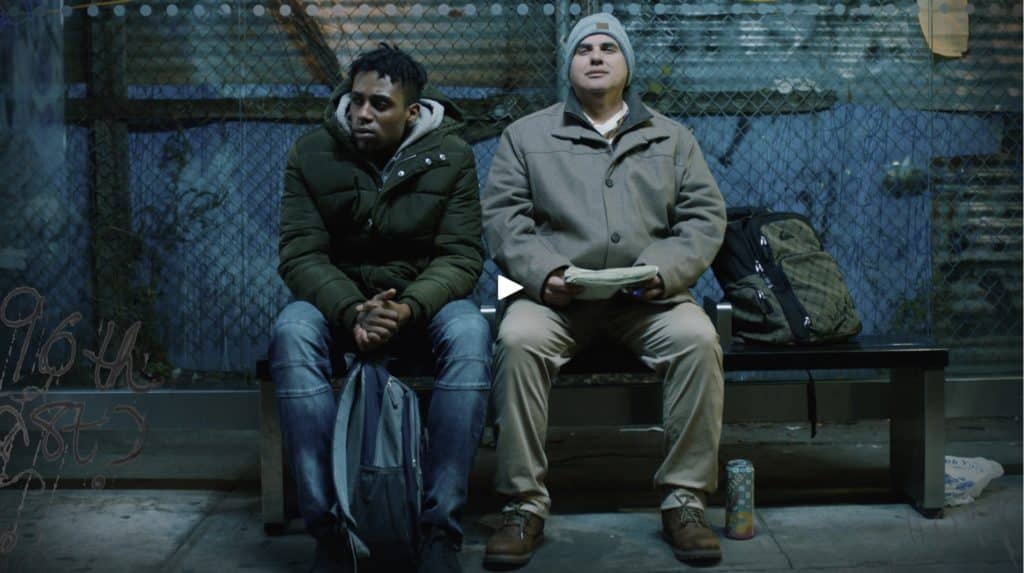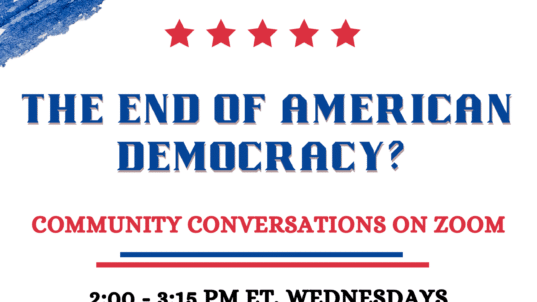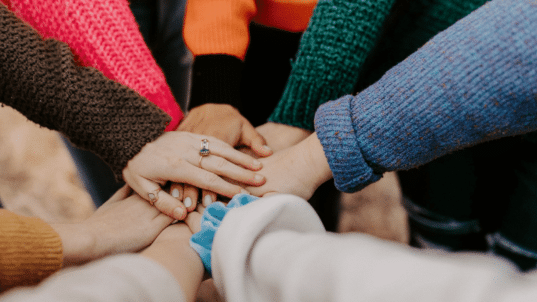
Robert Tarango and Steven Prescod in Feeling Through, by Doug Roland
It’s late on a cold winter night on the city streets when Tereek, a young man with no place to sleep, comes across Artie, a deafblind man, who is looking for help to make his way home. The short film Feeling Through tells the story of their encounter and of the connections that grow as they “feel through” to one another. This Oscar-nominated film served as the final event in our five-part film and conversation series The Human Condition(ed): Exploring our Social Connections and Disconnections.
Throughout this series we engaged in collaborative small group conversations to explore both the different forces that disconnect us from one another and the different possibilities for overcoming these disconnections. This film brought to mind the challenges of navigating a world built with little regard for people with disabilities, the challenges of financial fragility and homelessness, and the fundamental challenges of basic human communication.
To address these challenges, more than one participant suggested that generous and collaborative conversations, such as the ones we were having in this series, form an important pathway toward “feeling through” to one another. Discussions like these help us to listen openly to different perspectives and connect with others through collaborative exploration. You can read more about what the participants explored in the discussion summary below. And if you’d like to experience this connection, make sure to sign up for our next series when we announce them in the new year.
You can read the discussion summaries of the other film events at the links:
What challenges for human connection did the film bring to mind?
- Communication is an essential aspect of being human, so when there are communication challenges, they have a deep impact
- We simply have to find ways to communicate and connect with one another
- We have to be open to other ways of communicating—and not assume everyone is like us
- Communication takes time to develop—we have to “feel through” and find ways to reach each other despite obstacles
- Careful listening and openness to others is essential for effective communication
- We need to go deeper than external appearances when we encounter each other (surface judgments about a person’s race, housing status, or ability status can serve to block deeper connection)
- There are so many obstacles to building trust, from the building trust on a personal level, to building trust in the broader society
- There are so many factors that can isolate and separate us, like disabilities, homelessness, financial fragility—and the social stigmas that surround these
- We need better policies for accommodating people with disabilities and enabling them to participate more fully in society
- Unhoused people face a lot of challenges for living their lives, and we don’t make it easy for them
- NIMBYism—people want homeless people to be somewhere else, out if sight, out of mind
- So many people are opposed to doing anything to really solve the problem
- We need to recognize that unhoused people are still people—deserving of dignity and respect (we need to be more empathetic)
- Financial fragility is a major problem in our society—it’s very easy for people to fall into homelessness
- There are so many different ways to need help in our society
- As members of society, we need to develop a moral conscience and sense of communal responsibility to help others
- We need a higher base level of generosity in our society
How might we meet these challenges and foster more human connection?
- What if we shift the stigma from those who need help to those people, organizations, or structures that are making people need help?
- Stigmatize the way we create environments or infrastructure that isn’t inclusive of disabled people
- Stigmatize developers, policy makers, or planners who are pushing luxury housing rather than emergency or affordable housing
- We should change the built environment so that people with disabilities can more easily get around and participate in society—rather than relying on the kindness of strangers
- We should require adaptions to enable more equal participation by people with disabilities
- What if we developed our communities and buildings with universal design principles, to make our communities more inclusive of those with different mobility challenges (whether from disabilities or aging)?
- This might raise near-term financial concerns, but those would be outweighed by the long-term benefits for a more humane and inclusive society
- We need to think of our legacy for future generations—leaving a better world for them
- We live in a time when it’s easy to make things about “me”—but we need to center “us” by developing a stronger sense of community
- We need to develop love and empathy for our fellow humans
- Sharing our vulnerabilities can open us up to each other
- We need the ability to perceive needs and commonalities in others
- Films, works of art, and other popular media can help generate empathy and social connection
- They can help to destigmatize people with disabilities and people experiencing homelessness
- Discussions like this can help us to learn empathy by helping us to connect with other people and to see different perspectives in a spirit of openness
- Careful listening is essential to connect with others
- We need to “feel through” to connect with one another through our shared humanity
- Action and activism are needed—you have to stand up for what’s right
- Some may resent you speaking up, but more will appreciate it, especially if you are using your voice for those who are more vulnerable
- Small acts of kindness can loom large for those who need help
- We are capable of forming profound connections in a short amount of time when we help others
- Helping out can be transformative of the helper in a positive way



